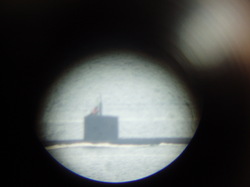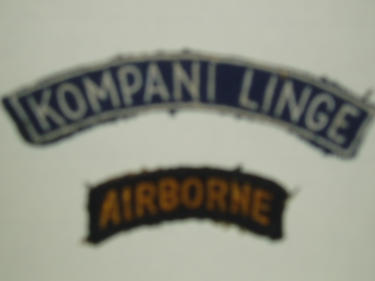PAGE 3 of 13, Click. SEA WAR, AMAZON, SKI RECORD ;PICTURE. 7 pictures.
To see full pages, scroll down them.
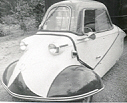
1955. Pd $850, new. German Messerschmitt. About 70 miles per gallon. Drive with stainless steel cable as used on sailboats. 3 wheels. If I parked on a hill sideways, It could tip over and I had to crawl out in my business suit. Traded later for sailboat. It would have been a good "investment" to just keep it. 2 passenger.
I miss it.
Picture above is what we used to watch for. in World 2 . I never worried much about dying as I knew my gasoline tanker would just blow up, so it would be painless. Funny how you are when you are 16. I did hope I would be off duty though, not down in the engine room .I got a small tatoo so they could identify my body if they ever found it .It cost $3, now I would pay far more to not have it. Don't get one until a few days before you die.
UPDATE. I just discovered these wartime secrets. The area I spent much time in , In Panama, in June 1944, I walked 6 feet awat from a line of Germans we had captured off their submarine, possibly in transit off the U-505 that helped end the war when we boarded and got the code machine. I should have spoken with them but could not tell by their clothing, I was alone with them. At the gate I was told who they were Too bad I was looking out the window in my high school German class a few months before..
The Caribbean, was by far the most dangerous part of the war with the highest casualty rates. It had a higher ratio of death than any branch of the military (overall).
We saw a lifeboat with two skeletons but it was too dangerous to stop and look. I feel every day is a bonus we escaped from one submarine.
The first time I worked on a boat was steering my Grandfathers fishing vessel at age 10, at age 15 I worked on the famous Kalakala ferry. More detail follows below.
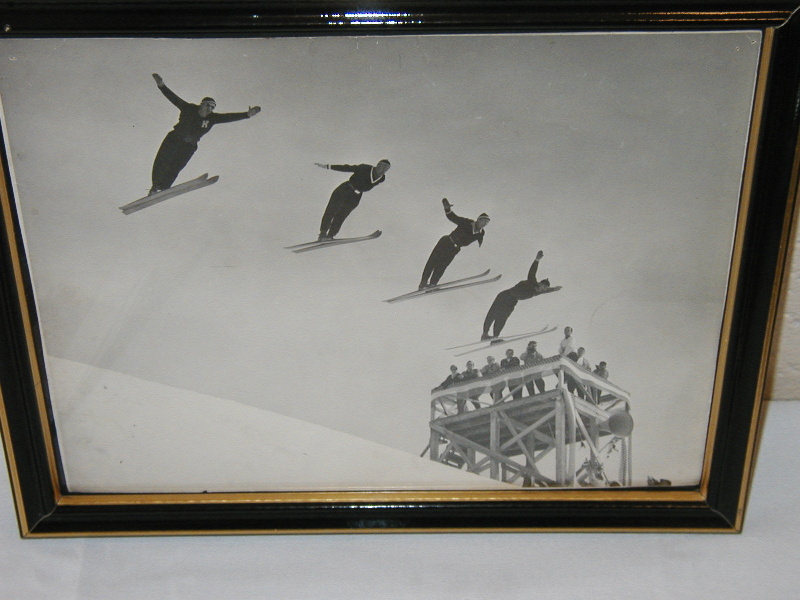
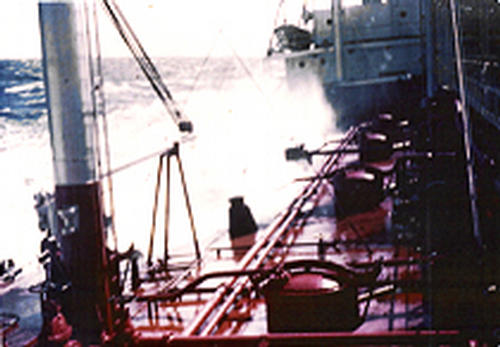
Important you scroll down more.
ONE OF 9 SHIPS I SERVED ON-----(age 15 to 19)
The reason many veterans do not want to talk about war service is they were exposed to death of friends and enemy. I decided after interviewing former prisoners of war, not to inquire too far, as they had to relive it in the telling of. Same for ship sinking survivor interviews, such as the Indianapolis, the more questions the harder for them. Of course there are always those who exaggerate, some of whom never left the mainland. They just leave off that detail in the telling.
Waves left flying fish flopping on deck. At night, no lights.Once we had a deck load of Corsair fighter planes. An English warship threatened to shoot out a light on us.
I was winning money at poker with older seamen. They thought I was psychic and suggested throwing me overboard.Twice I saw ships where the crew was arrested for killing their Captains. The crew can be as dangerous as the enemy.
We never slept well, with Zig zagging around submarines, dolphins that looked like torpedoes, and sea turtle heads that looked like periscopes, plus fog horns, fire drills, abandon ship drills and battle station drills. Each "drill" seemed real, we were never told ahead so it seemed real.. If there was any change in the pitch of the engines, I was to wake up instantly and run below, so we would not be a still target. The deck by my bunk was over heated fuel, too hot for bare feet.Once when we stopped I had to crawl inside a hole in a salt water evaporator opening just big enough or a hole for a skinny 16 year old. I was so skinny I had no shadow. if I stood sideways, you might not have seen me.
Garbage was emptied only afer dark so we left no trail. Sharks followed. I put a not in a bottle saying I was in the Pacific waters, but it was not dumped until we went thhrough Panama into the Caribbean. I have found notes in bottles and one or two of mine were found.
In Pearl Harbor we were treated like prisoners of war by armed Marines to get off base. Our freedom fighter sailors were "aliens". I would just borrow some navy clothes and wander around, like aboard the Oklahoma, which had just been righted. it was a sad scene next to us. I went to each destroyer and asked what movie was showing that night. We sold Cuban rum and Mickey Mouse Swiss watches we bought in the Dutch West Indies. Our radio operator heard Navy radiomen ask each other if they knew we had whiskey for sale. If we saw navy tankers like ours, they had 3 times the crew for each job and wondered where all our crew was, for our entertainment, we told them "the were killed" (we had no other crew anyway) Tied alongside us was a black U.S. submarine whose crew had just returned from two years in war duty.
I have ribbon awards as follows, Combat bar for attack by submarine, Atlantic war zone bar, pacific war zone bar. Over 40 years AFTER the war, they told us we could have free college, the same as those who were drafted and served on the U.S. mainland. We lost hundreds of ships with ALL the crews. The U.S. and it's territories lost over 1,500 ships and half were over 1,000 tons. We were under contract to the War Shipping Admiiistration.
The VFW would not accept us for membership. until very recently. That was not news to me, many a time in bars I would be challenhed to fight because I was in civilian clothes and they thought we were stealing their girls while they were getting ready go to war for the first time, and we had already been. We were almost NEVER on the mainland.Our job was to quickly load and unload and go back out into the war zones. We were like nitroglycerine,smokers were told that if they found themselves on deck with a cigarette, to put it inside their mouth. Tire ship could blow up from a spark in the wrong place, and they did blow up and break apart from storms also. Because of that, I enjoyed two weeks in Curacao Netherlands West Indies while they rebuilt our ship. The free Dutch treated us royally.
Go to war secrets and notes in bottles for audio version 206-365-1659 ext. 6605 and also 6066
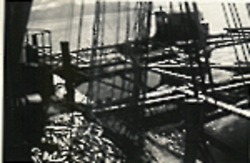
1945 Alaska fish trap guard shack 20 miles from anyone. No one on the island except ME when I rowed ashore, alias Robinson Crusoe. In this scene, cannery tender arrives 5 times a week to braile the salmon. The rest of the week I might have to contend with pirates, seals and eagles, taking salmon It was from this shack that I would take off on the weekend and sail with a blanket between upheld oars to other islands. An Indian friend came with and showed me many survival tips. No one told me that fish pirates sometimss killed the trap guards.
I was fish trap guard, an 18 year old war veteran, on an Alaskan island, 30 miles from other people. I lived in this floating shack with a crazy man who never rowed ashore, so I went alone daily. He only spoke of a lost Spanish gold mine he knew of near Bellingham in the US, lower states. We had no radio or television,or reading material, just nature in the raw wild.
An eagle would sit on a tall snag and wait for me to leave a piece of salmon out for it. I thought of the eagle as my friend. He liked baked salmon the way I did it, I told myself. Typicially we would get 5,000 salmon a day, but that was then. I usally took my time picking which one I wanted to bake, as if the color mattered, but if you wanted sockeye salmon, they were the best to pick. Each day would see as many as a thousand fish in the trap,as best I recall. As the dip net went over our heads, the flopping fish would drop thousands of scales on us.
On the streets of Ketchikan, you could not give away a salmon unless you had already cleaned it. I gave a ling cod to a shoe repair shop and when I came back that way, I saw a squaw carrying it, he had given it to her.
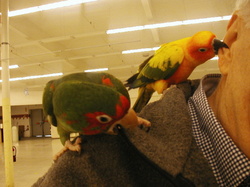
These two were pals and do this often, always together. They love to find new people to investigate. What a constructive imagination people like Nate W. had, to go to old empty stores and let the parrots make friends and fly around. This was in Ballard where bird owners would gather in an old store that has since been torn down for a skate board park.
This is a picture of Kjell Stordalens uniform patch. He was flown from England after training, to behind enemy lines in Norway. This was prior to coming to Anerica and being on the U of W ski jumping team. Being dropped "behind enemy lines in Norway, meant he was in his familys mountain cabin where he could do his whatever.
International Mensa award.
Neal Vonada, Seattle, USA, has been chosen as first recipient of the "Fred Carlin Award", named in honour of Fred Carlin, who died July 2005.
Neal is a regular poster to many groups where he likes to encourage discussion by introducing topics. He started mPositive in April 2002 on returning from the German AG in Tubingen where he spoke on "What is Wisdom". mPos presently has an international membership of more than 185 members from 44 countries.
Neal derives his sense of being positive from having sold cemetery plots and headstones for five years during his twenties. Writng about it made me realize for the first time my cafreer in sales and sales training meant that everytime someone said "no I don't want one" I had to thnk of all the positive reasons I could that they might benefit with whatever. It worked, and they were happy, and well armed with positive outlook about thier choice. Notice I say "their choice" I wanted them to want it, not just to make a sale.
Neal says:
"My strongest lessons to make me positive, was hearing people talk about their loved ones they lost and what they did NOT say, that is why I try to say 'it' daily, to someone, to anyone." (when I sold grave markers)
The "Fred Carlin Award" was created by a group of Fred's Mensa friends, Sally Edwards, Australia,Mark Griffin, England, Therese Moodie-Bloom in
Australia, John Paines, England, Sander Rubin in the US, and , Klara & Roland Schreiner, Germany, and Fred's sister, Abby Rosenblum. 3 of them are, or were, the head of Mensa for Australia, England and the United State. Our goal is international friendship across cultural borders that will lead to better understainding of positives. .
The committee statement reads--
"We are honouring Fred by identifying members of Mensa, anywhere in the world, who believe that Mensa is 'all Good', as Fred did, and who prove it by tireless enthusiasm for Mensa, being positive and encouraging others to participate.
"For these reasons, Neal Vonada richly deserves to win. I've seen him around on groups for many years and he is always friendly, thoughtful and encouraging. He is a POSITIVE influence in Mensa and sets a very high standard.
